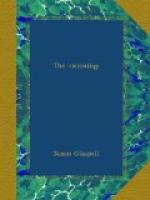Katie had always loved the great world of living things—the fishes and birds—all animals—all things that grew. They had always called to her imagination—she used to make up stories about them. She saw now that their real story was a thousand-fold more wonderful—more the story—than anything she had been able to invent. She would give much to have known it long before. She felt that she had missed much. There was something humiliating in the thought of having lived one’s life without knowing what life was. It made one seem such a dead thing. Now she was on fire to know all about it.
She smiled as it suggested to her what her uncle had said a few days before of the fresh paint. She supposed there was some truth in it, that one who was conserving the past must find something raw and ludicrous in her state of mind. Her passion to fairly devour knowledge would probably bring to many of them the same amused smile it had brought to her uncle. But it was surprising how little she minded the smile. She was too intent on the things she would devour.
Her glimpse into this actual story of life brought the first purely religious feeling she had ever known. It even brought the missionary fervor, which, as they sat down to rest, she exercised upon Worth, who had been proudly filling the office of caddy. She told him that she was going to tell him the most wonderful fairy story there had ever been in the world. And the thing that made it most wonderful of all was that, while it was just like a fairy story in being wonderful, it was every bit true. And then she told him a little of the great story of how one thing became another thing, how everything grew out of something else, how it had been doing that for millions of years, how he was what he was then because through all those years one thing had changed, grown, into something else.
As she told it it seemed so noble a thing to be telling a child, so much purer and more dignified—to say nothing of more stimulating—than the evasive tales of life employed in the attempt to thwart her childish mind.
Worth was upon her with a hundred questions. How did a worm become something that wasn’t a worm? Did it know it was going to do it? And why did one worm go one way and in a lot of million years be a little boy and another worm go another way and just never be anything but a worm? Did she think in another hundred million years that little bird up there would be something else? Would they be anything else? And why—?
She saw that she had let herself in for a whole new world of whys. One thing was certain: if she were to remain with Worth she would have to find out more about evolution. Her knowledge was pitifully incommensurate to his whys.
But it was beautiful to her the way his mind reached out to it. He was lying on his stomach, head propped up on hands, in an almost prayerful attitude before an ant hill. Did she think those little ants knew that they were alive? Would they ever be anything else? He wanted to be told more stories about things becoming other things, seemed intoxicated with that idea of the constant becoming.




